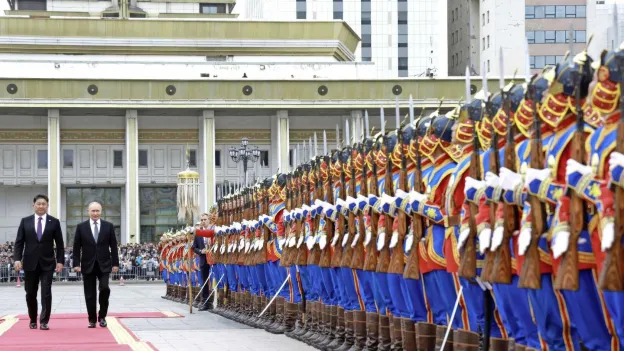
Mongolia Under Scrutiny for Failing to Arrest Putin During Visit

the hague - Mongolia faces criticism for not arresting Vladimir Putin during his visit to Ulaanbaatar, prompting the International Criminal Court to take action.
Mongolia came under fire for refusing to arrest Russian President Vladimir Putin when he visited Ulaanbaatar last month. This led to a reprimand from the International Criminal Court.
In a statement, the International Criminal Court emphasized that "states and anyone recognizing the jurisdiction of the Court are obligated to arrest and transfer individuals against whom arrest warrants are issued, regardless of their official position or nationality." The seriousness of the matter has led to Mongolia being referred to the Assembly of States Parties, the supervisory body in which all countries actively participating in the Court are represented. The case will be addressed at the next meeting of states parties in December.
This is indeed a unique situation. Since the International Criminal Court issued an arrest warrant against Putin in March last year, the Russian president has only visited countries that do not recognize the Court or have not ratified the Rome Statute, which established the basis for the international court. When Putin threatened to do so last summer – he was supposed to fly to South Africa, a treaty state, to participate in the annual BRICS summit – it caused such an uproar that the visit was canceled.
The case against Vladimir Putin by the International Criminal Court is also unique. It is the first time in history that the Court has prosecuted a sitting head of state without a request from the United Nations Security Council. Putin is also the first head of state from a permanent member of the Security Council to be prosecuted by an international body.
The Court accuses the Russian president of a war crime: he is alleged to be personally responsible for the deportation of Ukrainian children to Russia. The actual prosecution is complex, as Russia has signed but not ratified the Rome Statute. Moscow has also rejected the specific charge.
The fate of Mongolia now hangs in the balance. As mentioned, the Assembly of States Parties will consider the matter before the end of the year. In theory, the treaty states may take "all measures considered necessary" against Ulaanbaatar. The country will undoubtedly want to defend itself against the accusations. This was also the case leading up to Putin's state visit, when the Court reminded Mongolia of its obligation as a treaty state to arrest the Russian president.
Instead, President Ukhnaagiin Khurelsukh rolled out the red carpet for his colleague. In the meantime, the country invoked Article 97 of the Rome Statute and requested a consultation on the matter. This was formally a possibility, but according to the Court, the request came so close to Putin's arrival that there was no time for it. Mongolia further argued that Putin would have immunity as a sitting head of state, but that argument was dismissed by the Court.
A glance at the map shows that Putin can still visit many countries without fear of arrest. While the treaty states actively participating in the Court are in the majority, they are mostly Western countries. Many of Russia's allies are among the group of countries that have not ratified, signed, or withdrawn their signatures from the Rome Statute, as Moscow itself did after the arrest warrant was issued against the Russian president. Putin can therefore visit countries like China, Syria, or Belarus without any problem.
It is noteworthy that United Nations Secretary-General Antonio Guterres faced criticism this week for literally bowing to Putin while the International Criminal Court reprimanded Mongolia. Guterres traveled to Russian Kazan for the annual BRICS summit. Critics of Russia view this summit as an attempt by the Kremlin to show that Russia's international isolation after the invasion of Ukraine is not as severe as believed.
Therefore, it is not surprising that the Ukrainian Ministry of Foreign Affairs strongly criticized Guterres on social media, stating that "The UN Secretary-General ignored the invitation from Ukraine to participate in the first Global Peace Summit in Switzerland. However, he accepted the invitation from war criminal Putin to come to Kazan." Kiev believes that this is a "wrong choice" that "does not promote peace" and damages the reputation of the UN.
Others argue that Guterres, as the Secretary-General of the UN, should remain impartial and keep diplomatic channels open with all members of the organization. They also add that the International Criminal Court is an independent organization not under the auspices of the UN. However, even supporters of Guterres must acknowledge that his presence in Kazan and his bow to Putin did not strengthen the case of the Court against the Russian president.


Leave a comment